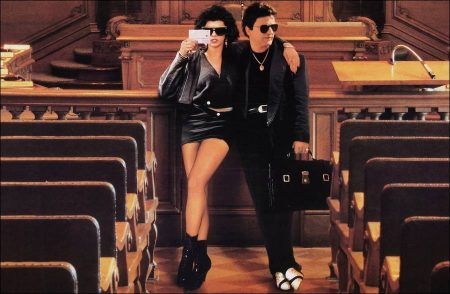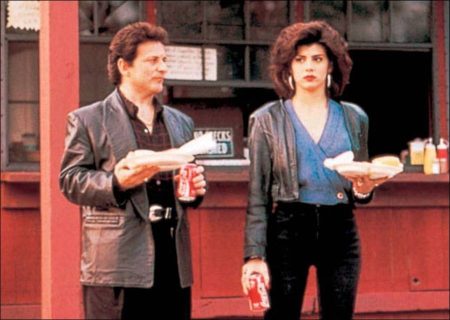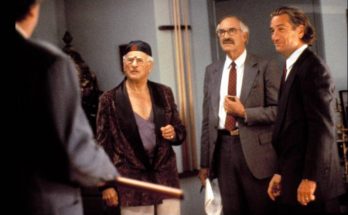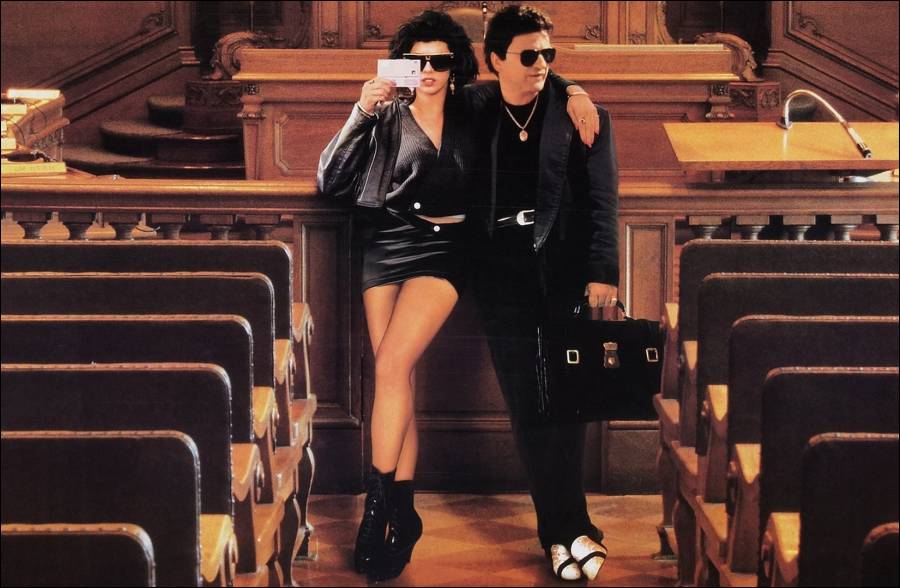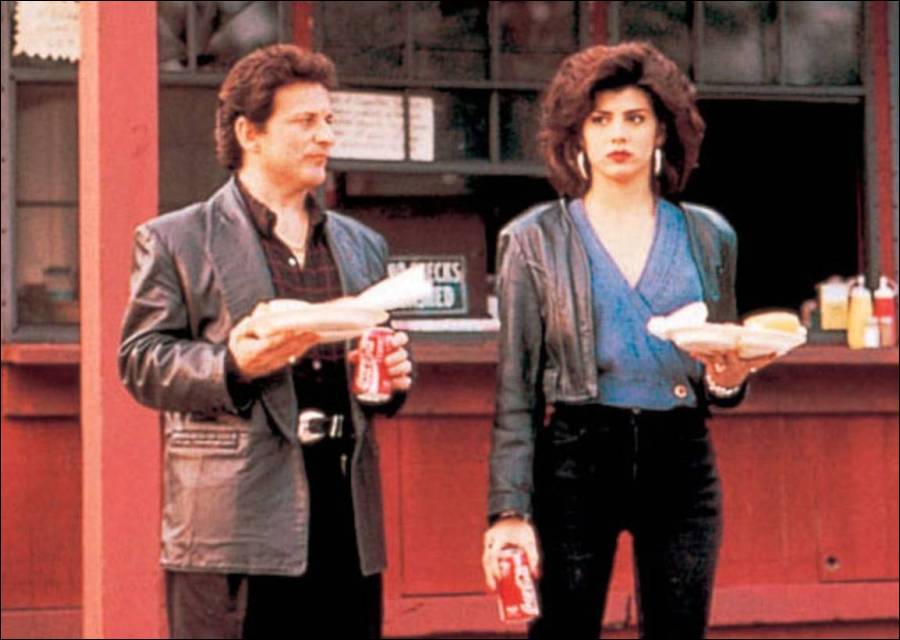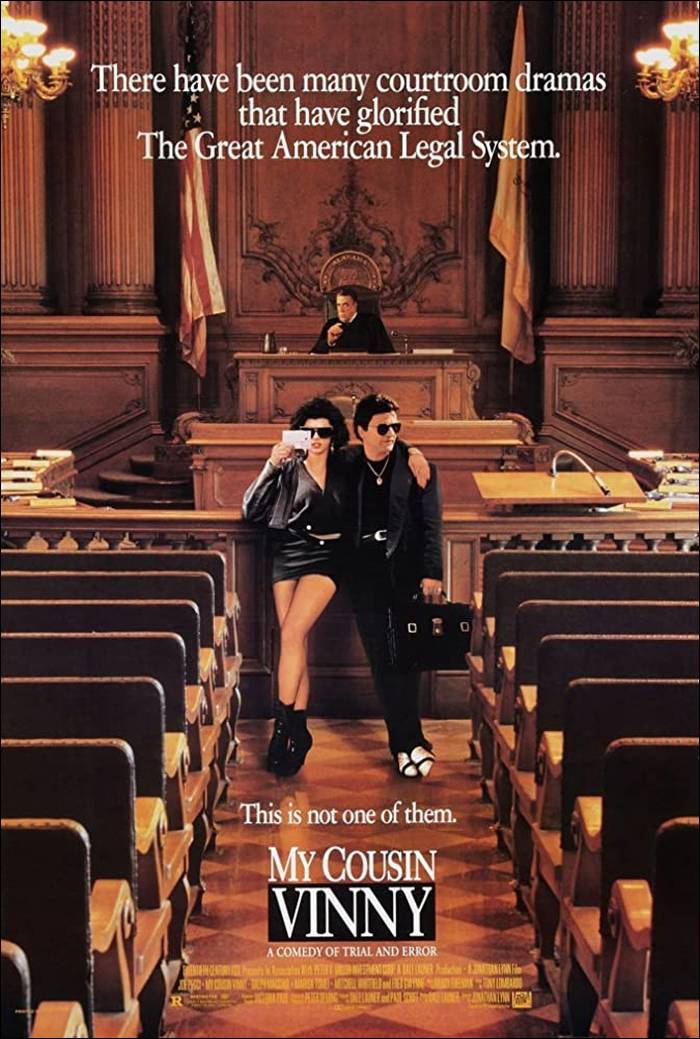Taglines: Truth, justice and The Gambini way.
My Cousin Vinny movie synopsis. When sweet Northern college kid Bill (Ralph Macchio) and his buddy Stan (Mitchell Whitfield) are picked up and thrown into the slammer in a hick Southern town, at first it looks like no big deal. Then they are informed that they are accused of murder. Penniless and without a single friend in the area, Bill decides to call his goofy cousin Vinny (Joe Pesci), who has somehow recently become a lawyer.
Full of family feeling and bravado, Vinny, who has never tried a criminal case in his short life as a lawyer, rides south to defend his trusting relative. He’s an expert motormouth and street-level logician from the wilder reaches of metropolitan New York, complete with a thick accent and the attitude to go with it. Otherwise, he’s much less well qualified than your average public defender.
When he arrives on the scene with his equally brassy girlfriend Lisa (Marisa Tomei), Bill is fairly sure he’s going to be sentenced to death. His buddy Stan is even less confident of his legal representative, if that’s possible, and the first thing Vinny has to do is to regain the consent of his clients to represent them. The local judge doesn’t seem any too sympathetic to Vinny’s verbal shenanigans either, and even the most optimistic supporter of the boys would begin to have doubts at this point — and Vinny’s no exception. With the insistent moral encouragement of his girlfriend, Vinny somehow accomplishes the impossible and wins grudging (if very irritated) respect from all concerned, for once studying as if his life depended on it.
My Cousin Vinny is a 1992 American comedy film directed by Jonathan Lynn, from a screenplay written by Dale Launer. The film stars Joe Pesci, Ralph Macchio, Marisa Tomei, Mitchell Whitfield, Lane Smith, Bruce McGill, and Fred Gwynne in his final film appearance. The film was distributed by 20th Century Fox and released on March 13, 1992.
The film deals with two young New Yorkers traveling through rural Alabama who are arrested and put on trial for a murder they did not commit and the comical attempts of a cousin, Vincent Gambini, a lawyer who had only recently passed the bar exam after several unsuccessful attempts, to defend them. Much of the humor comes from the fish-out-of-water interaction between the brash Italian-American New Yorkers (Vinny and his fiancée, Mona Lisa) and the more reserved Southern townspeople.
A critical and financial success, Pesci, Gwynne, and Tomei all received praise for their performances, and Tomei won the Academy Award for Best Supporting Actress. The film has also been lauded by attorneys for its accurate depiction of court procedure and trial strategy.

About the Story
Driving through Alabama in their metallic, mint-green 1964 Buick Skylark convertible, Bill Gambini and Stan Rothenstein, college students from New York who just got scholarships to UCLA, shop at a Sac-O-Suds convenience store and accidentally shoplift a tin of tuna. After they leave, the store clerk is robbed and killed, and Bill and Stan are arrested for the murder.
Due to circumstantial evidence and a confession to the shoplifting that is misconstrued as one to the shooting, Bill is charged with first-degree murder, and Stan as an accessory. Bill’s mother reminds him there is an attorney in the family: his cousin Vinny. Vincent LaGuardia “Vinny” Gambini travels there, accompanied by his fiancée, Mona Lisa Vito. Although he is willing to take the case, Vinny is a personal injury lawyer from Brooklyn, newly admitted to the bar and having no trial experience.
Vinny manages to fool the trial judge, Chamberlain Haller, about being experienced enough for the case. His ignorance of basic courtroom procedures, dress code, and his abrasive attitude cause the judge to repeatedly hold him in contempt. Much to his clients’ consternation, Vinny does not cross-examine any of the witnesses in the preliminary hearing. Except for lack of a murder weapon, it appears that the district attorney, Jim Trotter III, has a strong case that will lead to convictions. After Vinny’s poor showing at the hearing, Stan fires him and uses the public defender, John Gibbons, and nearly convinces Bill to do the same. However, in questioning the first witness, the public defender actually ends up bolstering the prosecution’s case, due to being nervous and stuttering incessantly.
Despite his missteps, Vinny shows that he is able to make up for his inexperience with an aggressive and perceptive questioning style. When he cross-examines the first witness, Vinny uses his newfound knowledge of the cooking time of grits to force him to admit that his perception of time may have been inaccurate, meaning he cannot corroborate the prosecution’s timeline, and Bill and Stan’s faith is restored. Stan fires the public defender and re-hires Vinny, who then proceeds to discredit the next two witnesses, by questioning their ability to make a positive identification due to obstructions in their line of sight, and impaired vision.
On the trial’s third day, Trotter produces a surprise witness, FBI analyst George Wilbur. Vinny immediately objects to the witness as Mr. Trotter failed to inform him properly ahead of time, but his argument is overruled. Mr. Wilbur testifies that the pattern and chemical analysis of the tire marks left at the crime scene are identical to the tires on Bill’s Buick. Judge Haller orders a lunch recess immediately after the direct examination of Mr. Wilbur.
Vinny asks for a full day’s continuance to properly prepare for cross-examination, but Judge Haller denies the request. With only the lunch recess to prepare and unable to come up with a strong line of questioning, Vinny lashes out at Lisa. However, Vinny realizes that one of Lisa’s photos holds the key to the case: the flat and even tire marks going over the curb reveal that Bill’s car could not have been used for the getaway.
My Cousin Vinny (1992)
Directed by: Jonathan Lynn
Starring: Joe Pesci, Ralph Macchio, Marisa Tomei, Fred Gwynne, Mitchell Whitfield, Lane Smith, Austin Pendleton, Maury Chaykin, Paulene Myers, James Rebhorn, Chris Ellis, Lou Walker
Screenplay by: Dale Launer
Production Design by: Victoria Paul
Cinematography by: Peter Deming
Film Editing by: Stephen E. Rivkin
Costume Design by: Carol Wood
Set Decoration by: Michael Seirton
Art Direction by: Michael Rizzo, Rando Schmook
Music by: Randy Edelman
MPAA Rating: R for language.
Distributed by: 20th Century Fox
Release Date: March 13, 1992
Views: 342
